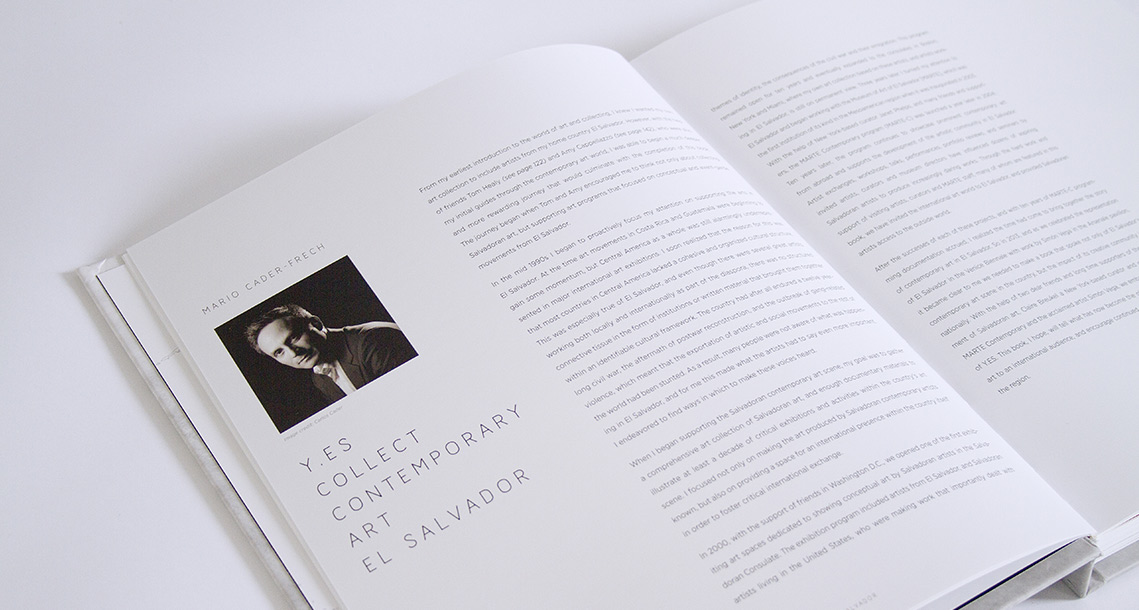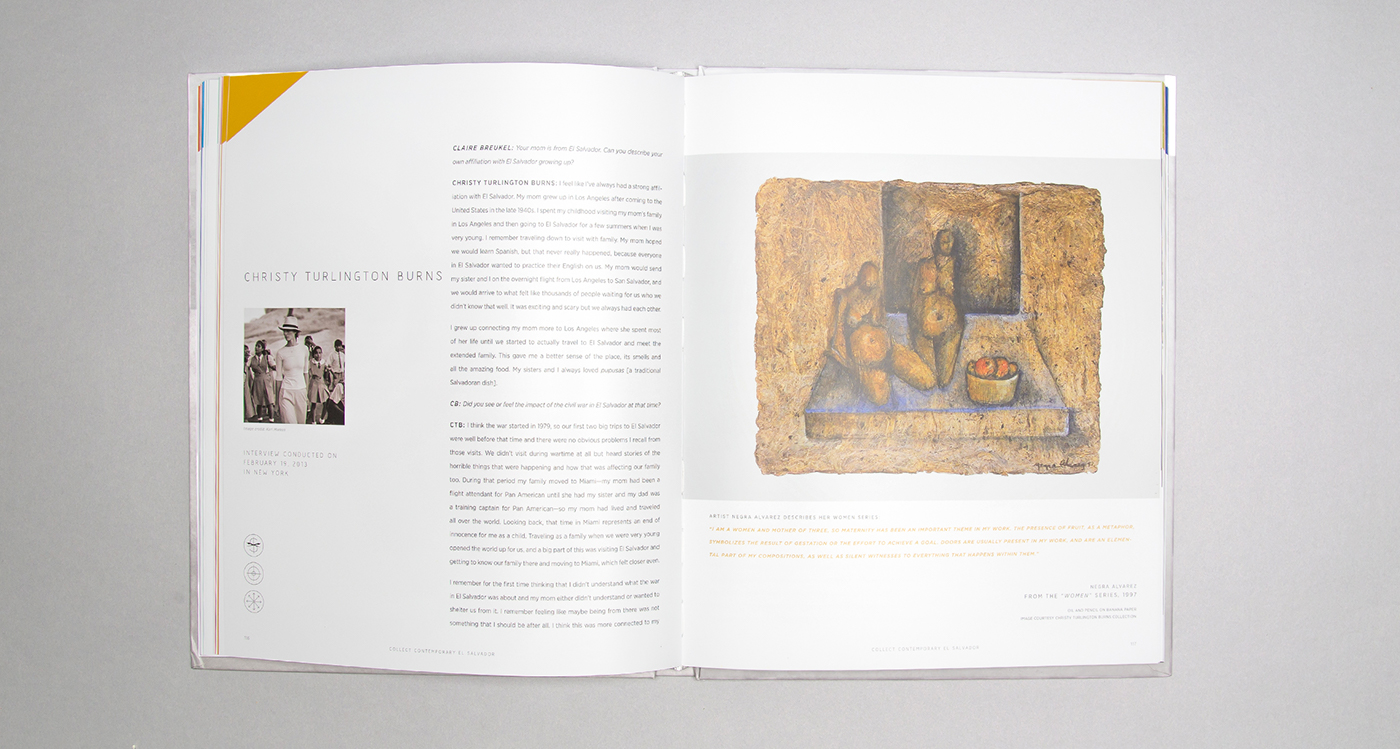Free E-BOOK download - descarga E-BOOK gratis
ABOUT
This 170-page hardcover book examines contemporary Salvadoran art through a series of interviews. Click here to download YES Collect Contemporary El Salvador as a pdf. E-books in Spanish are available on iTunes.
ACERCA
Este libro de tapa dura de 170 páginas examina el arte salvadoreña contemporánea a través de una serie de entrevistas. Haga clic aquí para descargar YES Collect Contemporary El Salvador en español como archivo pdf. Libros electrónicos en español están disponibles en iTunes
Title Y.ES Collect Contemporary El Salvador
The “Y” in Y.ES references Generation -Y as the book addresses contemporary artwork produced in, and about, El Salvador—“ES” from 2004-2014.
Publisher: The Robert S Wennett and Mario Cader-Frech Foundation
Editor: Claire Breukel
Co-Editor: Simon Vega
Production: Mario Cader-Frech
Assistant editor: Melissa Diaz
Concept: Claire Breukel, Mario Cader-Frech and Simon Vega
Size: 10.75 Tall x 8.75 Wide x .90 Deep (inches)
Weight: 3.075 Lbs
Y.ES ISBN: 978-099080230
Y.ES UPC: 3369550092
KEY THEMES
A History of War
Art Market, No Art Market
The Diaspora and exchange
The impact of the Internet
FEATURED ESSAYS
Click here to read the Publisher's Essay
Click here to read the Editor's Essay
PRESS KITS
PRESS KIT in english
PRESS KIT en español
ENTREVISTAS
El libro cuenta con veintiocho entrevistas con una amplia red de artistas, curadores, galeristas, directores de museos, coleccionistas y críticos que aportan su punto de vista del arte y de El Salvador. Estos incluyen las ideas de Alanna Heiss, Alanna Lockward, Amy Cappellazzo, Bonnie Clearwater, Brandi Reddick, Celia Birbragher, Christy Turlington Burns, Ella Fontanals-Cisneros, Elvis Fuentes, Ernst Hilger, el Dr. Harper Montgomery, Irvin Morazan, José Ruiz, Kency Cornejo, Marc Spiegler, María Bonta de la Pezuela, Mauro Herlitzka, Mayra Barraza, Patricia Gardner Amare, RonaldMoran, Retna, Roberto Galicia, Roger Atwood, Sam Keller, Simón Vega, Tom Healy, Walterio Iraheta y Zélika García, junto con dos ensayos por Mario Cader-Frech y editora Claire Breukel.
INTERVIEWS
The book features twenty-eight interviews with an extensive network of artists, curators, gallerists, museum directors, collectors and critics who contribute their perspective of art in and of El Salvador. These include the insights of Alanna Heiss, Alanna Lockward, Amy Cappellazzo, Bonnie Clearwater, Brandi Reddick, Celia Birbragher, Christy Turlington Burns, Ella Fontanals-Cisneros, Elvis Fuentes, Ernst Hilger, Dr. Harper Montgomery, Irvin Morazan, José Ruiz, Kency Cornejo, Marc Spiegler, Maria Bonta de la Pezuela, Mauro Herlitzka, Mayra Barraza, Patricia Gardner Amare, Ronald Moran, RETNA, Roberto Galicia, Roger Atwood, Sam Keller, Simón Vega, Tom Healy, Walterio Iraheta and Zelika Garcia, along with two essays by publisher Mario Cader-Frech and editor Claire Breukel.
QUOTES
Amy Cappellazzo
The art market is susceptible to trends, and the up side is that when focus is on a region their artists gain exposure and opportunity. A global network also ensures that artists who are living and working in the diaspora stay connected to their country of origin. Nowadays, identity is considered with much more complexity.
Marc Spiegler
“What is still esse ntial is the kind of open criticism that makes each art scene and its artists stronger. Public criticism forces artists to confront weaknesses and misdirections in their work.“
Christy Turlington Burns
“I went to visit the Espacio gallery on the trip when I went down for a calendar shoot, and it turned out the gallerist, Rina Alviles, is my mom’s cousin! I bought two pieces of art. One was El Tambor by Mexican artist Jose Luis Cuevas, which I still have on my wall, and the other was a painting by Negra Alvarez from her “Women” series, and it depicted a torso of a pregnant woman with the head cut off—it was dark but not like in the depictions of the massacres that happened during that time. I felt that a lot of the artwork being made by younger postwar artists was really interesting, and I just couldn’t help but connect to the works that addressed women losing their babies and being exposed to brutality and violence.”
Ronald Moran
“El Salvador has had many years of total evasion—we had a whole generation of artists evading important subjects by contemplating an idyllic reality that did, and does, not exist. Our generation is consistently reflecting on who we are through what we do. It is not only in our art making, but also in our sense of social responsibility to teach and educate others.”
Jose Ruiz
“We can’t forget that this generation of contemporary artists grew up during the Salvadoran Civil War so for them socially-based practices and works of protest are a serious endeavor.”
Celia Birbragher
“Art in a country needs three things: support of collectors, support from institutions and from the government.








